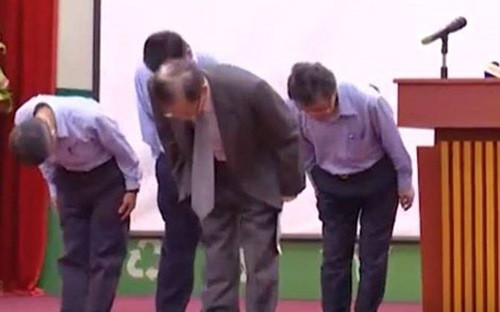What do economic experts say after the Formosa incident?
Viewpoints of some economic experts and National Assembly delegates after Formosa apologized and committed to compensate for the pollution incident in the central sea...

Formosa Ha Tinh leaders bowed to apologize to the Vietnamese Government and people on June 28.
Recently, the leader of Formosa Ha Tinh Steel Corporation (FHS) apologized for the serious marine pollution incident in the Central region, along with a commitment to compensate for damages of 11,500 billion VND, equivalent to 500 million USD.
Immediately after the information was officially announced, public opinion initially welcomed the determination of the Government and authorities in determining the cause and culprit.
From their perspective, some economic experts and National Assembly delegates believe that the environmental pollution incident in the central coastal region needs to be handled strictly, and at the same time, the response of management agencies during the incident needs to be more timely and transparent.
Here are some opinions from experts:
“All projects in Vietnam must be reviewed”
Ms. Pham Chi Lan, economic expert, former member of the Prime Minister's Research Committee
The Formosa story offers Vietnam many lessons, both short-term and long-term.
First of all, the lesson is about attracting investment. We absolutely cannot be greedy for investment in economic development and forget about environmental issues. Any project, no matter how positive it is economically, but has a negative impact on the environment, must be resolutely rejected.
And more importantly, through the Formosa story, from now on, the Government must have a high commitment to the country, the people and future generations, that it will not accept any economic project that destroys the environment.
Along with that, it is necessary to review all projects that have been and are operating in Vietnam, right from the time of reviewing the documents as well as before going into operation. When granting licenses, it is necessary to consider their "history" both domestically and internationally.
Even state projects must strictly comply with environmental regulations.
I have noticed that, for a long time, it seems that the authorities have only focused on "scrutinizing" private projects, while a series of large state and foreign projects with high risk of violations are often ignored.
As for Formosa, this corporation has violated environmental laws in many countries, even in Taiwan, the press has reported, but when entering Vietnam they are still welcomed.
Reality in Vietnam shows that there are many large investors who enjoy many incentives but often violate their commitments, not only regarding the environment. A series of automobile companies that committed to localization do not do so, and some large companies violate transfer pricing...
In particular, regarding the environment, Vietnamese agencies often do not have the capacity to accurately assess. Therefore, many projects can only put their trust in investors.
I also regret that in the press conference announcing the cause of fish deaths on June 30, there was no mention of the responsibilities of relevant individuals and organizations, especially the management agencies. The Government should direct the clarification of this issue.
I also hope that when assessing the damage, independent organizations should be involved, not just government agencies. In addition to economic compensation for the people, long-term environmental compensation for all four provinces should be considered.
“Lessons on State Interaction with the Public”
Mr. Vo Tri Thanh, Deputy Director of the Central Institute for Economic Management (CIEM)
Through the Formosa story, we can see one thing very clearly: this is a serious incident, having a negative impact on the lives of people in the Central region and on long-term sustainable development.
We look at this issue not as an incident, but as a story about policy making for development, about the State's behavior towards the public and society.
The issue of sustainable development, green growth with foreign investment attraction, not focusing on quantity, but paying special attention to quality and efficiency of sustainable development has been raised for a long time - in the process of reform and innovation in Vietnam many years ago.
But why does the Formosa incident still happen? I think there is a problem with awareness, there is still something lax in management, which sometimes leads to a very high price for the environment.
Behind that is also achievementism, a lack of seriousness in supervision and ensuring legal sanctions.
I also want to emphasize that the serious incident caused by Formosa is not the “last straw”. The “cup” of the problem is the environmental risk when we accept the project, so this time it can be considered a “bowl of water” that makes the cup overflow, not just a drop.
Another lesson is that we must be serious about small things. It is the awareness and responsibility of each citizen and each business, and we need to impose really serious sanctions. Gone are the days when people thought that they had to be rich and have a lot of money before considering environmental solutions. We must be serious and strict from the beginning with all actions of the people and businesses in the country.
Finally, a very big lesson is the interaction and behavior of the State towards society and the public.
This lesson is not new, but it shows once again that if we are not serious in implementing reforms, it can lead to negative social consequences for development.
Therefore, the State's behavior must be transparent, clearly showing the role and responsibility of the State apparatus. It may be due to the need to collect information, the time required, or the capacity that we cannot meet all the demands of society, but we must be clear and consistent in our policy messages.
Need to "investigate" collective and individual responsibility involved
National Assembly Delegate Bui Thi An, Member of the National Assembly's Committee on Science, Technology and Environment
The incident caused by FHS is an environmental disaster, not only causing many fishermen to suffer, but also severely affecting the fisheries and tourism industries, leaving unpredictable long-term consequences.
I watched the clip of the FHS leader apologizing to the Vietnamese Government and people. In my opinion, in terms of material, 500 million USD is not enough to solve the immediate consequences, not to mention the long-term consequences, which are incalculable in the long term. The question of many voters about the compensation figure of 500 million USD is completely reasonable.
Therefore, not only FHS, but also the Government needs to assess the damage, as a relative basis for determining the compensation amount.
In the longer term, an effective mechanism is needed to monitor FHS's commitments to remediate incidents, ensure the complete treatment of toxic substances before they are released into the environment, and restore the marine ecosystem.
What are the specific financial and technological solutions, what is the time schedule, what are the implementation results, and must be publicly announced to voters every quarter.
The government also needs to review all coastal and riverside industrial zones to detect and, if there are any environmental violations, to handle them thoroughly.
It is constitutionally stipulated that all citizens should live in a clean environment, so investment cannot be attracted at any cost. It is necessary to consider the entire operation process of a business before approving them to invest in Vietnam. Special attention should be paid to the issue of technology, to avoid turning Vietnam into a “dumping ground”.
Another issue that I think is also very important, in order to prevent a similar incident from happening again, is to "pursue" responsibility for the relevant groups and individuals.
According to Vneconomy








